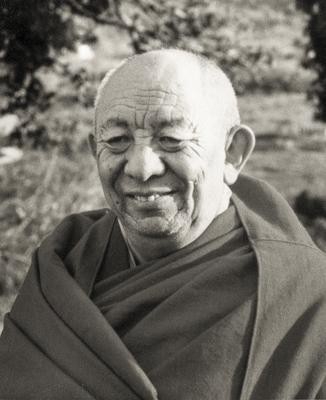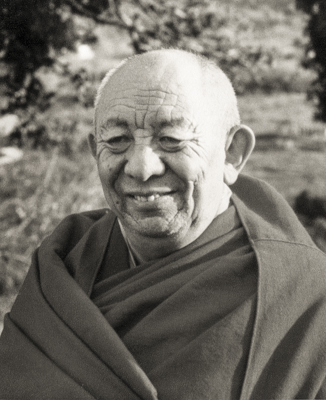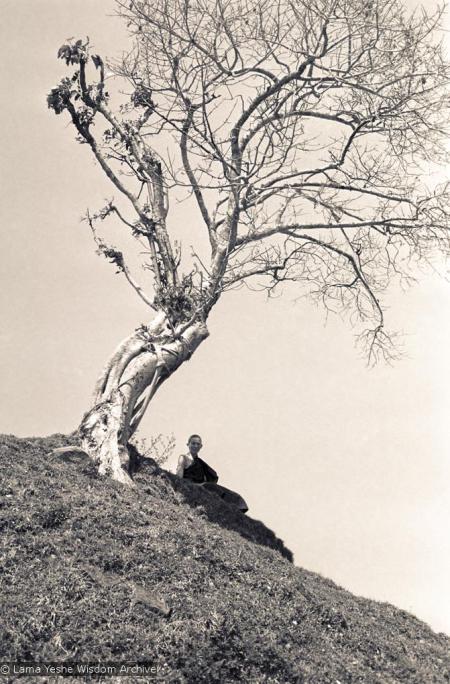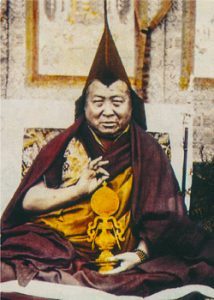| Advice from Khen Rinpoche Geshe Thubten Chonyi, resident teacher at Amitabha Buddhist Centre, Singapore. These teachings offer valuable advice related to our Dharma studies and practice: how to check whether our practices are Dharma, the need for study and constant reflection on the Buddha's teachings, and how to overcome our afflictions and problems so that we can truly benefit others. Transcribed, edited and prepared for publication by the editorial team at ABC, Singapore.
Daily Reflections is available as an ebook from online vendors. |
CHAPTERS
Daily Reflections
i. Introduction and Biography
1. What is Dharma?
2. Studying the Dharma
3. Need for Reflection and Analysis
4. Overcoming Negative Emotions
5. Practising Pure Perception
6. Faith
7. Advice on Practice
8. Precious Human Rebirth
9. Death and Impermanence
10. Overcoming Attachment to the Body
11. Joyous Effort
12. Subduing Anger
13. Generating Bodhicitta
14. Wisdom Realizing Emptiness
“There is nothing to fear other than my mind”
The Mighty One has said that all such things
Are (the working of) an evil mind,
Hence within the three world spheres
There is nothing to fear other than my mind
(Verse 8, Chapter 5, A Guide to the Bodhisattva’s Way of Life by Shantideva)
All the fears of cyclic existence and the three realms, the suffering we wish to avoid and the happiness we are seeking arise from the mind. Likewise, all qualities depend on the mind.
When you check all the scriptures, this is also their main message – that there is a need to discipline our minds. We can understand this from our personal experience. When the afflictions – anger, attachment, ignorance, pride, jealousy and so forth – arise, suffering and unhappiness are always the result. The stronger the afflictions, the greater the suffering. On the other hand, when we have less discursive thoughts, when the three mental poisons arise infrequently, when the mind is concentrated or focussed on benefiting others, there is more mental peace and we tend to be happier with fewer problems.
By reflecting along these lines, we will understand why it is said that all fears and worries originate from the mind. Therefore, we should protect the mind against non-virtue and guide the mind towards virtue, with mindfulness and introspection. When we fail to do this, although we yearn for happiness, we run away from the causes of happiness. Although we wish to avoid suffering, we pursue the causes of suffering.
We are controlled by our minds that, in turn, are controlled by the negative emotions that disturb our mental peace and calm. That is why we feel unhappy and suffer. We need to immerse our minds in virtue instead, because when this happens, happiness is the result.
Realising the nature of our minds
There is a saying by the great Kadampa masters: “The difference between cyclic existence and nirvana comes from whether we have realised the nature of our minds or not.”
Liberation may seem external, like a distant place. But it can be achieved on the basis of our minds. In the same way, cyclic existence is not an external phenomenon. It abides in our minds. As long as our minds are under the control and bondage of the afflictions, we remain in cyclic existence. We achieve liberation at that very moment when our minds are freed from the control of our afflictions. So liberation is not something far away or external, and once liberated, we will experience everlasting bliss and happiness.
With reference to the paths and grounds – from the path of accumulation through to the path of preparation, followed by the path of seeing, the ten bodhisattva grounds, the path of no more learning and, finally, enlightenment – the difference between each level and each ground is primarily based on the qualities of the mind and its development. We assert that someone has achieved and is abiding in a specific path on the basis of their mental development, not their physical transformation. How do we differentiate between a bodhisattva and a non-bodhisattva? The difference does not lie in their external appearances but on whether that person has developed bodhicitta or not.
Another way of looking at the quotation is this: As soon as we have realised the ultimate nature of the mind, its lack of true existence, we are liberated from our afflictions.
Engaging in physical and verbal virtues (or positive actions) contributes to our mental development and this helps us one day to realise the emptiness of our minds. When we achieve the wisdom realising emptiness, we destroy cyclic existence. This is one of the benefits of realising emptiness.
When our self-cherishing attitude is very strong, it is very difficult for our actions to be virtuous. Furthermore, during the course of engaging in virtue, other afflictions such as competitiveness, jealousy and pride arise.
For example, arrogance and conceit may arise when we are doing retreat, “I am in retreat and they are not.” Also, during the course of this five year Basic Program, we have acquired some knowledge and understanding of the Dharma. That knowledge can be the condition for us to feel superior to others, thinking, “I know more than you do.”
It is important that our actions do not become the conditions for the development of jealousy, competitiveness and pride. These afflictions are harmful and therefore, we must learn how to apply the antidotes to overcome them.
Advice from Gungtang Rinpoche: Check the state of your mind day and night
Guntang Rinpoche advises, “If we want to make our days and nights meaningful, we should always check the state of our minds.” No beneficial actions can result from a mind that is under the control of the three mental poisons (ignorance, anger and attachment). Therefore, we should always strive to keep our minds in a positive state, thinking constantly of how to benefit others. When our actions are motivated by a negative mind, it is questionable whether those actions can be beneficial.
It is important to set a proper motivation before we begin any virtuous activities, such as doing our daily commitments. We are advised in the teachings to begin always with the meditation on the breath to bring the mind to a state of equilibrium, especially when we find that our minds are agitated by anger or attachment. Otherwise, it is difficult to generate a positive state of mind while doing the practices.
When the mind is in a state of equilibrium, it is easier to prevent negative thoughts from arising, even though we may not yet be able to eliminate our attachment or anger from the root. It becomes possible for us to consider those we normally think of as enemies or objects of aversion as pleasant and as friends. When engaged in virtuous activities, we should pay heed to the objects of desire and the objects of aversion. We should sincerely dedicate the merit we accumulate from our practices to their welfare from the depths of our hearts. It is easy to habituate ourselves to dedicating our merit in this way compared to giving away material things such as our bodies.
When we dedicate all the roots of our virtue to our enemies, does that mean there is nothing left for us, that we are not going to experience the beneficial effects of those virtues? I don’t think so. So, don’t worry.
When we dedicate our roots of virtue sincerely in this way, it is difficult to say how much benefit will actually be received by the objects of our dedication but, without a doubt, we will benefit and see the improvement in our minds. We will definitely benefit because we can see that all our problems and sufferings arise from attachment and anger in our lives.
When we neglect checking the state of our minds, then no matter how profound or extensive our prayers may be, it is difficult for those practices to be beneficial even for ourselves. When we do not benefit from our practices, then it is difficult for us to benefit others.
Gungtang Rinpoche also said: “If you wish, however, to make your life meaningless and empty, then by all means, please continue to spend your whole life being conceited and arrogant and spend your time partying, gossiping and shopping.”
Developing the virtuous mind
This is advice from the Kadampa masters: When our minds are virtuous and our motivation positive, then our physical and verbal actions will naturally be virtuous and positive. We will not harm but instead benefit others. Conversely, when our minds are in negative, non-virtuous states, it is very difficult to generate positive behaviour. We are most likely to give problems to others and be harmed by them in return. The Kadampa masters therefore advise us to generate a good heart and develop a positive mind and motivation.
We are now studying the practice of exchanging ourselves for others and developing bodhicitta, the main point of which is to develop the virtuous, positive mind. A positive state of mind leads to positive and beneficial behaviour that helps us to become good-hearted, virtuous people. It is very difficult to change our minds overnight. We have to start reducing negative physical and verbal actions by reducing our negative states of mind. While we may not be able to completely remove such negativities, we can work towards reducing them.
What are the benefits of being good-hearted people? We will be protected by the worldly gods who delight in virtue and receive blessings from the buddhas and bodhisattvas. Temporal goals are easily achieved. When death comes, we will move on easily to the next life and achieve enlightenment very quickly.
The internal enemy
Lama Atisha said, “When we can subdue our minds, then no external enemy can harm us. But if our minds waver, with the external enemy acting as the condition, our internal enemy will burn our minds. Therefore, defeat and destroy this internal enemy.”
We cannot be harmed by external enemies when our minds are loving and compassionate but if we succumb to the three mental poisons, our mental peace is destroyed. It is not the external enemy, who acts only as the condition, but our afflictions which are responsible for the destruction of our mental peace.
It is the very nature of our afflictions to do this, so our real enemies are the internal ones, our afflictions, which are the real trouble-makers. We should therefore put effort into destroying them.
We need both mindfulness and introspection to protect and guard the mind. Mindfulness protects our minds by not forgetting what is to be abandoned and what is to be cultivated, and introspection is the part of our minds that checks to see whether our minds are up to virtue or non-virtue.
It is important to protect and guard our minds because only we know our own minds. No one else does. We are our own masters because only we know what is going on in our own minds. We need to check to see whether our minds are in a virtuous or non-virtuous state because only by protecting our minds will we be able to prevent ourselves from being stained by downfalls and faults and guard our three doors.
Need for constant and persistent effort (1)
The great Indian master, Chandragomin, said that when someone is very sick with a serious disease, e.g., leprosy, but does not take the proper medicine continuously over a period of time, then that patient will never recover from his illness.
This is analogous to the situation we are in. We have been controlled by the three mental poisons for a very long time. In order to free ourselves from this bondage, we have to familiarise ourselves with and meditate on the antidotes continuously for a very long time. Meditating occasionally when we feel like it will not work.
We also need to train in the complete path, not just doing the virtuous practices we enjoy and then hoping or expecting those afflictions to just weaken or disappear. It does not work like that. We have to meditate on the complete path.
We do engage in virtuous practices, but sometimes we feel that, despite doing all sorts of practices, we are not getting anywhere, we are not improving. This is how we may feel sometimes. Actually, things are getting better but we should not expect to see instant results. Sometimes, when we engage in certain practices, we expect to see results in a day, a month, a year or even a couple of years. It does not work like that. We may not be able to see very tangible results for quite a while.
Our afflictions are like the very heavy sicknesses of a patient. We have been harbouring these afflictions, the three mental poisons, in our minds for a very long time. In order to heal ourselves of these afflictions, we need to meditate and rely on the antidotes continuously for a long period of time. If we rely on the antidotes every now and then, as and when we feel like it, then we are not going to reap much benefit from them.
Need for constant and persistent effort (2)
The great Indian master, Chandragomin, said that the fruits of a fruit tree whose roots are always submerged in a pool of sour muddy water will be sour and not sweet. If we want the fruit tree to bear sweet fruits, fertilising it with just a few drops of sweetener will not work.
In the same way, we have been controlled by the three mental poisons since time without beginning. That being the case, hoping for a major mental transformation by doing a little daily practice and some small virtues, and expecting fantastic results and a huge reduction in our suffering is completely unrealistic.
In order for us to attain the fruit of the state beyond sorrow, the cessation of all our suffering, we need to remove our afflictions from the root. Hoping to achieve this by some small exertions on our part is like expecting a harvest of sweet fruit in the above analogy.
Removing our mental afflictions is extremely difficult and requires reliance on continuous effort for a long period of time. Sometimes, we may feel this is an almost impossible task. It is natural for us to think in this way because it is true that the negative emotions have been with us since beginningless time, not just a few lifetimes. We are thoroughly familiar with them. It is as if the afflictions have merged with the very nature of our minds, making it impossible to separate our minds from them.
Although this may be the way we feel and how things appear to us, if we critically analyse the situation, we will find that this is not the case, because if we apply the appropriate antidotes, we will definitely be able to free our minds from these negative emotions.
Look at our lives. What are we doing everyday? Are we actively doing something to weaken our afflictions or are we actually strengthening them? If we are honest with ourselves, we find that not only are we not doing anything to overcome our afflictions but in fact, we are allowing them to become stronger as we encounter the objects and conditions which cause them to arise.
In order to destroy our mental afflictions, the only way is to put effort continuously into weakening and destroying them. If we do not do this, there is no hope of the negative emotions ever becoming weaker or being destroyed.
Reflection on impermanence
The great Nagarjuna once said that someone who would put rubbish or vomit into a precious golden bejewelled container would be considered very foolish indeed. We should reflect on how this statement applies to ourselves.
Having achieved the precious human rebirth and met the teachings of the Buddha, we call ourselves Buddhists and take on the different levels of vows and commitments. Yet, instead of accumulating virtue, we spend our time committing negativities. That is both very unskilful and unwise and if that is our situation, we must do something to overcome it. Those negative activities arise due to the three mental poisons in our minds which we must work to subdue.
The stronger the negative emotions – our attachment to friends and loved ones and aversion and hatred towards our enemies - the more powerful will be the resultant negative actions generated by them. It is, therefore, very important that we work very hard to reduce the strength of the three mental poisons. We are not suggesting here that friends or enemies do not exist but we are trying to reduce the negative emotions we generate towards them.
One of the best ways of doing this is to reflect on impermanence. For example, to reduce our hatred towards an enemy, we should reflect on his impermanent nature, how he will definitely die one day and the uncertainty of that time of death. Our enemy will probably be very fearful both at the time of death and during the intermediate state. He may also be reborn in the lower realms because of his own negativities. Reflecting how our enemy is controlled by his own afflictions and negative karma, it becomes possible for us to generate compassion instead of hatred towards him.
We can reflect in the same way to reduce our attachment towards our loved ones. They will also die one day and it is uncertain when death will come. They will experience suffering and fear at the time of death and in the intermediate state and take rebirth in the lower realms. Reflecting in this way, we substitute our attachment and desire for them with compassion.
We ourselves are also impermanent and we should reflect on the fear that we will encounter at the time of our own death. When we give in to our negative emotions, we create negativities that lead to great suffering and fear in the intermediate state, which will only throw us into the lower realms.
By reflecting on these different points, we develop renunciation. Of course, it will be very difficult for us to remove our afflictions from the root now, but by reflecting on these points, we can at least reduce the strength of those afflictions when they manifest. This is something we must do.
At this time, we have achieved this precious human body and the opportunity to listen to and discuss the Mahayana teachings. We understand that if we were to engage in negative actions, we would have to take rebirth in the lower realms. We accept the existence of the hells and the lower realms. We also accept the possibility of higher rebirths as humans and gods. Therefore, we are more knowledgeable than those who have no exposure to such teachings.
In spite of having such knowledge, when it comes to the actual practice of working to overcome our afflictions, instead of our reducing them, they actually become stronger. If this happens, we will be exactly as Nagarjuna said – very foolish and stupid. We must do something about this situation.
When we meet with difficulties, we should try to apply and reap some benefit from our Dharma knowledge. It seems that, sometimes, we are unable to do this, so that when problems come, our suffering seems to be even more intense and the bad experiences seem much more difficult to handle. This should not be the case.
Advice from Gungtang Rinpoche: Overcoming the stubborn mind of self-cherishing
Guntang Rinpoche points out how we always cherish ourselves. It is this evil mind of self-cherishing that is our downfall. Only when we are able to overcome this very stubborn self-cherishing mind, which is as hard as wood, then enlightenment will not be very far away.
In the same way, we are always controlled by our three mental poisons which only lead to misfortune and our downfall. We desperately want happiness but our afflictions bring only problems and suffering.
The essence of Rinpoche’s advice is that enlightenment can only be achieved when we are able to subdue our stubborn minds. Whatever virtues we do with our bodies and speech, they must ultimately lead to subduing our minds. If this does not happen, then there is no way we will achieve enlightenment.
There are students who say they have been practising for a long time – for 10, 20, 30 years – but they do not see any progress. This is the fault of not transforming their virtuous actions of body and speech into methods that will help them to subdue their negative minds. It boils down to this failure to transform their minds.
Our narrow-minded outlook
Mental suffering can only be reduced through adopting the correct mental perspective. The more we are able to think from different perspectives, the better equipped we will be to deal with our mental difficulties. Our mental unhappiness can never be solved by wealth, possessions or medication.
The reason why we experience mental unhappiness is because of our narrow-minded outlook. We tend to fixate on some small aspect of the problem. When we think in such a way, the mind will always remain narrow, tight and stressed. We need to widen our minds, make them bigger, more expansive and relaxed, by considering the problem from multi-faceted angles. Although it is difficult to experience immediate benefits from the mind-training techniques given in the text we are now studying, when we continue to listen, critically analyse and familiarise ourselves with the teachings, we will definitely experience some benefits and be able to reduce our mental suffering over time.


 harma [Tib: chö] means to hold, or uphold. What is it that Dharma upholds, or maintains? It is the elimination of suffering and the attainment of happiness. Dharma does this not only for us but for all other sentient beings as well.
harma [Tib: chö] means to hold, or uphold. What is it that Dharma upholds, or maintains? It is the elimination of suffering and the attainment of happiness. Dharma does this not only for us but for all other sentient beings as well.
